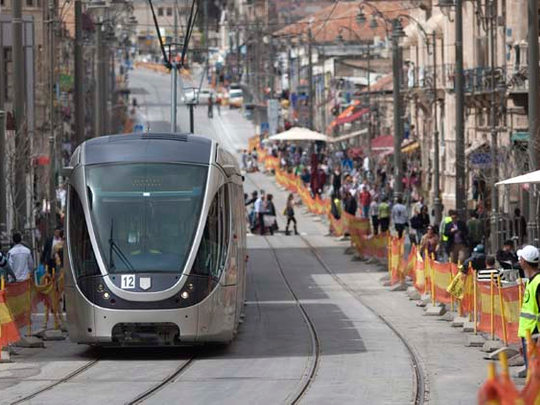
London French transport giant Alstom has lost a $9.4-billion (Dh34.49 billion) rail tender in Saudi Arabia, a move thought to be punishment for the company's involvement in Israeli expansion projects in occupied Jerusalem.
The Saudi Railway Organisation (SRO) has awarded a contract for the second phase of the Haramain rail link between Makkah and Madinah to Al Shoula, a consortium of 12 Spanish companies, after facing pressure for awarding its first phase worth $1.8 billion to Alstom in February 2009.
Alstom, along with another French firm, Veolia, were involved in Israel's Jerusalem Light Rail (JLR) project that links occupied Jerusalem to illegal Jewish-only colonies in the West Bank.
The service began in August.
Palestinian ambassador in Riyadh Jamal Shobaki lauded the Saudi move, saying it was in response to regional developments and the "Arab Spring", referring to the wave of pro-democracy protests and revolutions in Arab countries since December 2010.
The Palestinian National Authority and civil society organisations had been putting pressure on Saudi Arabia to withdraw the contract from Alstom and prevent it from bidding again.
Positive response
Palestinian activists campaigning for a boycott of Alstom and Veolia had complained that while there had been a positive response to their campaigns in Europe, their calls had fallen on deaf ears in the Gulf states.
Both companies are facing a lawsuit in France. Veolia sold its 5 per cent stake in the Israeli project in June 2009 after allegedly losing up to $7 billion in potential contracts in Europe, and Alstom sold its share last January.
Omar Barghouti, a Palestinian human rights activist, however, said that Alstom continues to be "deeply involved" in the JLR project, holding 80 per cent ownership in one of the contractor companies, and full ownership in the maintenance company.
The SRO could not be reached for comment, and a spokesperson for Alstom did not respond to a request for an interview by the time of going to press.
The Boycott, Divestment and Sanctions [BDS] campaign against Israel, of which Barghouti is co-founder, welcomed the Saudi move as a victory for its efforts to stigmatise relations with Alstom.
It is unclear, however, if the Saudi decision was made as a result of pressure. Both Alstom and Veolia have other lucrative contracts in each of the six Gulf Cooperation Council states.
Alstom issued a statement saying it "regrets that it wasn't chosen [for the Haramain project] but underlines that its bid prices were at the lowest level that the group could propose within its financial guidelines", according to Bloomberg.
Contracts of such magnitude often carry political weight and involve rallying by top officials. Juan Carlos, the king of cash-strapped Spain, called King Abdullah Bin ABdul Aziz of Saudi Arabia to thank him for the awarding of the contract to a Spanish consortium. It is reported to be the biggest international contract ever won by Spanish companies.
In February, French Prime Minister Francois Fillon raised the issue on a trip to Saudi Arabia. In May 2009, then French trade minister Christine Lagarde travelled to Saudi Arabia to lobby the government on behalf of Alstom.
Not new policy
"This is not a new policy in Saudi Arabia. Saudi Arabia has historically supported the Palestinian cause, but there was growing awareness in Saudi Arabia about [the controversy over] the project," Shobaki told Gulf News.
While the issue was not covered in the Saudi press, coverage of the story in the Palestinian press "made it to Saudi Arabia", he said, adding that "officials here knew about it".
Shobaki said that the Ministry of Foreign Affairs in Ramallah had sent his embassy a memo asking him to raise the matter with Saudi officials.
Saudi Arabia has recently taken a strong stand in support of the Palestinian National Authority's efforts to take the vote for statehood to the United Nations.
In doing so, it is expected to clash with its close ally, the United States, whose President Barack Obama has threatened to veto a resolution in the Security Council.












